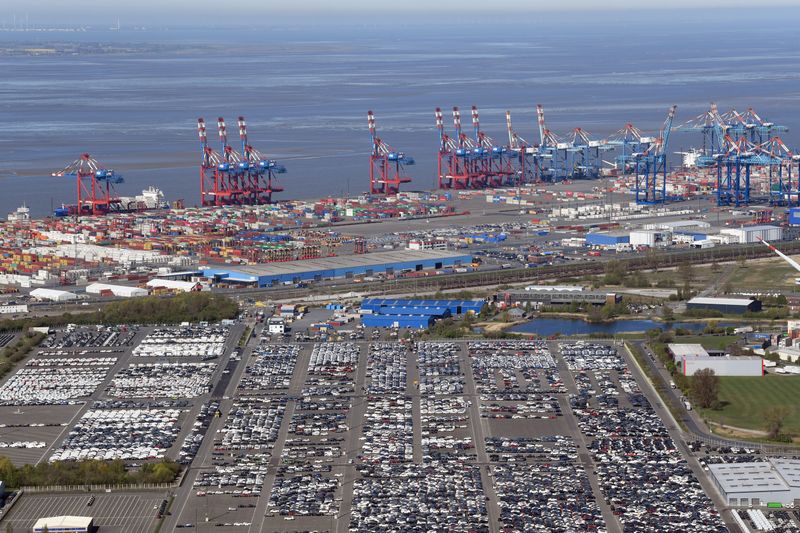BERLIN (Reuters) – German exports fell by 11.8% in March, their steepest drop since current records began in 1990, as the coronavirus crisis reduced demand for goods from Europe’s biggest economy, the Federal Statistics Office said on Friday.
Seasonally adjusted imports fell by 5.1% and the trade surplus narrowed to 12.8 billion euros ($13.88 billion) from a downwardly revised 21.4 billion euros in February, the office said.
Economists polled by Reuters had expected exports to fall by 5% and imports by 4%. The trade surplus was expected to come in at 18.9 billion euros.
The German government expects the economy, which depends on exports, to shrink by a post-World War Two record of 6.3% despite a massive rescue package of 750 billion euros to cushion the impact of the pandemic.
Economists expect any recovery to be slow and the pace to largely depend on how fast Germany’s European neighbours and other trade partners like China and the United States emerge from the crisis.
“The interdependence of the global economy will be disastrous for the export sector during the coronavirus crisis,” Alexander Krueger of Bankhaus Lampe wrote in a note, adding that the worst was still to come.
Friday’s trade figures were the latest data to offer a gloomy outlook for Germany, which had been in its 11th straight year of growth before the outbreak.
Both industrial orders and output posted record drops in March, data published earlier this week showed.
Germany’s export-oriented manufacturers had been struggling with weak demand set off by trade frictions that preceded the coronavirus crisis, leaving the economy to rely on consumption and state spending for growth.
But lockdown and social distancing measures introduced in mid-March have curtailed household spending expectations even as Germany starts to gradually reopen its economy.
A survey by the GfK institute on Friday showed that a third of Germans plan to spend less and 33% believe their financial situation will worsen in the next 12 months.
That bodes ill for the prospects of a consumption-driven recovery.
“The new ‘normal’ will be marked by a difficult economic situation and tight consumer budgets,” said Petra Sueptitz of GfK. “Retailers and manufacturers must adjust to this.”
A separate survey by the DIHK Chambers of Commerce found that 60% of Germany’s companies are suffering from reduced demand and 80% expect revenues to fall this year.
The DIHK’s Volker Treier said that one silver lining of the crisis could be a detente in the trade conflict between China and the United States, which would benefit German companies present in both countries.
“We are sliding into a global economic crisis,” said Treier. “We expect German exports to fall by at least 15% this year.”
(Writing by Joseph Nasr and Klaus Lauer; editing by Michelle Martin, Larry King)






















